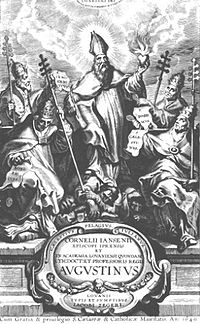
Augustinus
Encyclopedia

Cornelius Jansen
Corneille Janssens, commonly known by the Latinized name Cornelius Jansen or Jansenius, was Catholic bishop of Ypres and the father of a theological movement known as Jansenism.-Biography:...
. Published posthumously in Louvain
Leuven
Leuven is the capital of the province of Flemish Brabant in the Flemish Region, Belgium...
in 1640, it was in three parts:
- On PelagianismPelagianismPelagianism is a theological theory named after Pelagius , although he denied, at least at some point in his life, many of the doctrines associated with his name. It is the belief that original sin did not taint human nature and that mortal will is still capable of choosing good or evil without...
- On original sinOriginal sinOriginal sin is, according to a Christian theological doctrine, humanity's state of sin resulting from the Fall of Man. This condition has been characterized in many ways, ranging from something as insignificant as a slight deficiency, or a tendency toward sin yet without collective guilt, referred...
- On divine graceDivine graceIn Christian theology, grace is God’s gift of God’s self to humankind. It is understood by Christians to be a spontaneous gift from God to man - "generous, free and totally unexpected and undeserved" - that takes the form of divine favour, love and clemency. It is an attribute of God that is most...
It began with the proposition that Augustine of Hippo
Augustine of Hippo
Augustine of Hippo , also known as Augustine, St. Augustine, St. Austin, St. Augoustinos, Blessed Augustine, or St. Augustine the Blessed, was Bishop of Hippo Regius . He was a Latin-speaking philosopher and theologian who lived in the Roman Africa Province...
was a man chosen by God to reveal the doctrine of grace. Thus, by this logic, any later
Catholic teaching
Magisterium
In the Catholic Church the Magisterium is the teaching authority of the Church. This authority is understood to be embodied in the episcopacy, which is the aggregation of the current bishops of the Church in union with the Pope, led by the Bishop of Rome , who has authority over the bishops,...
contrary to Augustine's work should be revised to match it. The text stoked the theological controversies that raged in France and much of Europe after the spread of Jansenism
Jansenism
Jansenism was a Christian theological movement, primarily in France, that emphasized original sin, human depravity, the necessity of divine grace, and predestination. The movement originated from the posthumously published work of the Dutch theologian Cornelius Otto Jansen, who died in 1638...
. Five of the books' propositions were considered heretical and condemned as such by pope Innocent X
Pope Innocent X
Pope Innocent X , born Giovanni Battista Pamphilj , was Pope from 1644 to 1655. Born in Rome of a family from Gubbio in Umbria who had come to Rome during the pontificate of Pope Innocent IX, he graduated from the Collegio Romano and followed a conventional cursus honorum, following his uncle...
in his bull Cum occasione issued, May 31st, (1653). In reaction to this condemnation, Blaise Pascal
Blaise Pascal
Blaise Pascal , was a French mathematician, physicist, inventor, writer and Catholic philosopher. He was a child prodigy who was educated by his father, a tax collector in Rouen...
wrote his 17th and 18th Lettres provinciales
Lettres provinciales
The Lettres provinciales are a series of eighteen letters written by French philosopher and theologian Blaise Pascal under the pseudonym Louis de Montalte...
in 1657.

